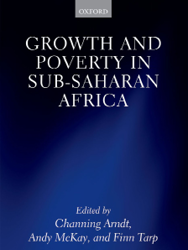Book
Growth and Poverty in Sub-Saharan Africa
This book is Open Access, click here to download.
- Includes 16 country case studies which collectively represent nearly three-quarters of the sub-Saharan African population
- Analyses welfare, living conditions, and poverty reduction
- Contributions from local and international experts who identify and explain trends in monetary and non-monetary poverty and their links to growth
While the economic growth renaissance in sub-Saharan Africa is widely recognized, much less is known about progress in living conditions. This book comprehensively evaluates trends in living conditions in 16 major sub-Saharan African countries, corresponding to nearly 75% of the total population. A striking diversity of experience emerges. While monetary indicators improved in many countries, others are yet to succeed in channeling the benefits of economic growth into the pockets of the poor. Some countries experienced little economic growth, and saw little material progress for the poor. At the same time, the large majority of countries have made impressive progress in key non-monetary indicators of wellbeing.
Overall, the African growth renaissance earns two cheers, but not three. While gains in macroeconomic and political stability are real, they are also fragile. Growth on a per capita basis is much better than in the 1980s and 1990s, yet not rapid compared with other developing regions. Importantly from a pan-African perspective, key economies-particularly Kenya, Nigeria, and South Africa-are not among the better performers.
Looking forward, realistic expectations are required. The development process is, almost always, a long hard slog. Nevertheless, real and durable factors appear to be at play on the sub-continent with positive implications for growth and poverty reduction in future.
 Join the network
Join the network